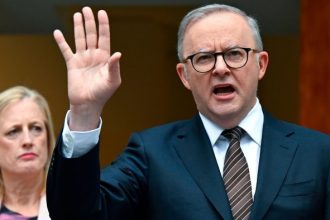Unlock the Editor’s Digest for free
Roula Khalaf, Editor of the FT, selects her favourite stories in this weekly newsletter.
Hungary will approve Sweden’s Nato membership, Viktor Orbán said in his first public appearance since a close ally quit last week in a mounting domestic political crisis.
Giving his annual state of the nation speech on Saturday, the Hungarian prime minister said parliament would sign off on Sweden’s accession to the defence pact when its spring session begins this month. Hungary will be the last Nato member state to do so.
“The good news is, our disagreement with Sweden is about to conclude,” Orbán said. “We made important steps with the Swedish premier to rebuild trust and we are headed for a ratification of Sweden’s Nato membership.”
The move comes as he seeks to quell a rare domestic revolt against his rule. Tens of thousands of demonstrators took to the streets of Budapest on Friday evening in the latest of a series of protests about a controversial pardon that a member of Orbán’s government issued to a convicted criminal.
Orbán’s ally Katalin Novák resigned as the country’s president last weekend after becoming embroiled in the row about a pardon she had issued to a man who had been convicted as an accomplice for helping cover up a sex abuse case in a children’s home. Judit Varga, leader of the ruling Fidesz party’s 2024 European parliament election list, also stepped down.
On Friday another former Orbán minister and the premier’s spiritual leader, Zoltán Balog, was forced to step down as the head of the Reformed Church in Hungary after admitting he had urged Novák to sign the pardon.
However, the moves were not sufficient to assuage the demonstrators who regard the scandal as evidence of hypocrisy by Orbán’s party. Fidesz has long touted its reputation for family values, including introducing anti-LGBTQ laws that it characterises as “child protection”.
In his speech to supporters on Saturday, Orbán sought to lay the blame for the scandal fully on Novák. “Her decision unwound the unity of the nation, which she could not fix,” he said, adding that it had been “like a nightmare”.
The Hungarian leader, one of Europe’s strongest backers of Nato sceptic Donald Trump, is engaged in a long-standing row with other EU member states over his waning loyalty to western alliances amid the war in Ukraine and his country’s moves towards becoming a self-styled “illiberal democracy”.

Budapest has been reluctant to send aid to Ukraine or to approve Sweden’s Nato accession, citing a lack of respect and frequent criticism from Stockholm.
Orbán’s domestic critics have accused him of many of the same things that he has attracted international criticism for, including an erosion of liberal democracy. In his speech, Orbán invoked this opposition as “the risks we must face each day”, complaining that “nation’s independence and sovereignty is [being] targeted” by powerful external forces.
The scandal is especially dangerous for Orbán as it threatens to erode his backing among core supporters, many of whom regard the government as being complicit in the case.
“I am deeply repulsed,” said György, a 60-year-old engineer from Budapest, who declined to give his full name for fear of repercussions. He said this was the first time he had attended a protest against Orbán, for whom he had voted several times. “Never again. This makes me feel our side is no better than the Communists,” he said.
The protest drew an enormous crowd to Heroes’ Square, a Budapest landmark where Orbán shot to international fame in 1989, when as a 26 year-old youth leader he spoke to a rally demanding the immediate withdrawal of Soviet troops from the country.
Read the full article here




